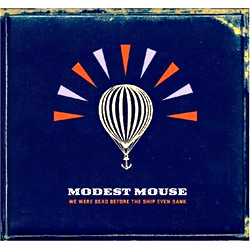Modest Mouse
We Were Dead Before the Ship Even Sank
(Epic)
Modest Mouse are a wonderfully wonky band. I’ve always likened them to an untamed animal. But musically, they are more akin to a bag full of instruments; turn them upside down and shake them just a little, and the whole mess will crash to the floor. This is the dynamic that makes them so engaging, and is why I’ve kept listening over the years. It’s also why adding a new member is a tricky situation.
When I first met frontman Isaac Brock in the summer of 2005, he told me that former Smiths guitarist Johnny Marr would be flying to Portland that August to help him write the follow-up to Good News for People Who Love Bad News, widely considered the band’s “breakthrough” because it contained two pop hits, “Float On” and “Ocean Breathes Salty.” I winced, admittedly with awe, at the fact that Brock would be willing to pair up with the Manchester native in such a way. As a true artist—one who is wickedly charming and always a little distracted by his own head—Brock struck me as the type who had to hole up, search deep inside himself, and emerge with the icy nugget that is a Modest Mouse song. How would an ’80s guitar icon be able to help with that?
Turns out, Marr is the perfect foil for the direction Brock needed to take the band. The result, We Were Dead Before the Ship Even Sank, is the group’s tightest and most consistent record. Marr’s guitar is the star here, pushed front and center in the mix as it is. But Brock is still the punchy little shit he always was—the kind of vocalist it’s impossible not to form an opinion of—and all the familiar Mouse elements abound: rubber-band guitars, funky bass, and cracked-out drumming. The album gets a running start with classic Mouse ranting and raving on “Invisible,” followed up by the immediately catchy “People as Places as People.” Those who barked loudest when they heard “Float On” played during the Rose Bowl will cringe at about one-fourth of the album, given how radio-ready the songs are. But drop your judgments, and this album will pay off in spades. It’s still as cold, dark, and weird as anything the band’s created, especially on “Parting of the Sensory” and “Steam Engenius.” We’ll no doubt be mulling over lyrics such as “While we’re on the subject/Can we change the subject now?” and there’s no question that with “Little Motels,” Brock has written the most unflinchingly romantic and affectionate song of his career. As with every Modest Mouse record, it will probably take a couple of years for the whole album to sink in. You can’t ask for much more in a work of art. BRIAN J. BARR
The Stooges
The Weirdness
(Virgin)
On “Trollin’,” The Weirdness‘ first cut, Iggy Pop declares, “Rock critics wouldn’t like this at all,” and if he’s right, the Stooges’ improbable comeback will collapse on the starting line. In the end, though, most reviewers are apt to view the disc as an honorable miss, not a flat-out disaster. There was never much chance that these guys could recapture the glory days, and these 12 serviceable but strangely self-conscious songs prove it. Granted, guitarist Ron Asheton and his drumming brother, Scott, come across as game; and ex–Minutemen bassist Mike Watt and producer Steve Albini are ideal recruits. But while “Greedy Awful People” and the rest are overtly primitive, they never seem on the verge of implosion, as does 1969’s The Stooges. Moreover, Pop’s vocals, which once had to fight for their place amid the instrumental maelstrom, are out front and prominent, thereby placing too much emphasis on lyrics that smack of forced nihilism (“My idea of fun/Is killing everyone”) or metaphysical dumbness (“I saw Frank Zappa eat a lonely hot dog”). Take that, rock critics. MICHAEL ROBERTS
Urban Legends
Of Old Lost Days
(Contraphonic Music)
While last year’s The Body, the Blood, the Machine showed that the Thermals are coming into their own as a pop-punk force to be reckoned with—with bold production and thematic tendencies—I find myself longing for the cut-and-paste quality of their debut, More Parts per Million. That record possessed those singular qualities that made indie rock great, but which it has lost in recent years: regionalism and egalitarianism. Urban Legends was the pre-Thermals group of frontman Hutch Harris, and these recordings take me back to those roots. The collection possesses the exact cuteness, dorkiness, and melodic structures of his current band’s material but is more of a singer-songwriter affair. Recorded in various studios, basements, and apartments between San Jose, Calif., and Portland, Ore., the songs are very lo-fi, but this is evidence of what Harris was working toward on the Thermals’ current incarnation. His voice was the same nasal strain it is now, but backed with peppy acoustic guitars and minimal snare and cymbal, some songs resemble the retro sketch-pad-and-Crayola pop of the Ne’er Do Wells. If there is such a thing as a Thermals completist (looking at my record collection, I realize I’m an accidental one), they’ll delight in the appearance of Thermals bassist Kathy Foster on a few of these cuts. A lot of the songs sound like Thermals demos, which, in a way, they were. BRIAN J. BARR




